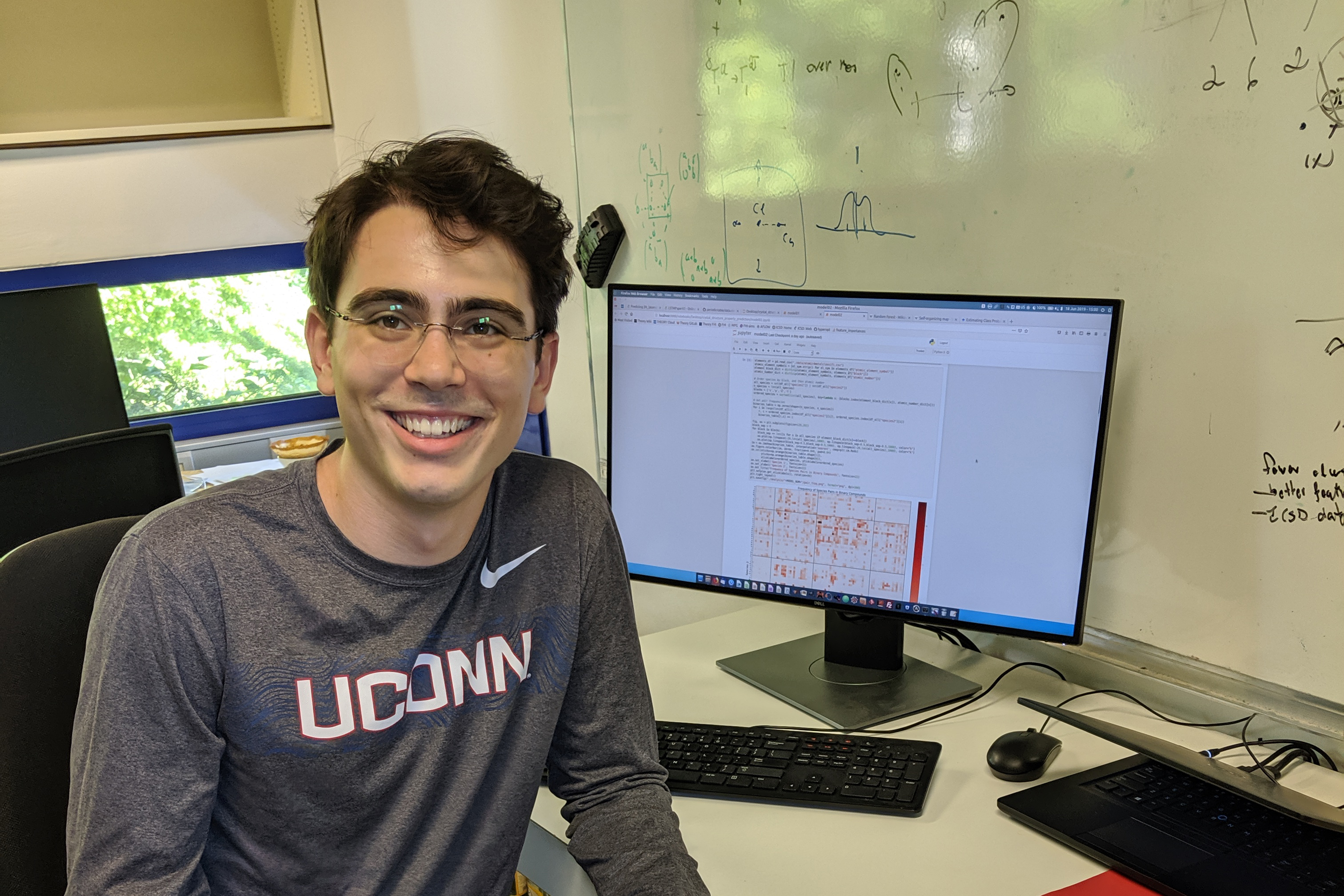When Berk Alpay ’21 (ENG, CLAS) mentions the future, he’s not talking about what he’s going to have for dinner (Hint: Chang’s Garden on Route 195 has been a favorite since he was a kid.) or what courses he’d like to take next semester. Not even what his plans are for after he graduates with a dual degree in computer science and math, although he briefly mentions a Ph.D. and a career in research.
No, when Alpay talks about the future, he’s talking about the role of artificial intelligence (AI) and how our lives may change in the coming decades.
For some of us, AI may sound like a scary proposition. Not so much for Alpay. He’s intrigued by the possibilities while urging us to take precautions in developing new AI systems.
“Right now in its current form, AI is pretty docile. But I do think that if some key steps occur, they will have a huge impact. I don’t know exactly what they could be. But for instance, if someone found a way to increase a machine’s intelligence and whenever the machine takes a step it gets more intelligent — and this could go on indefinitely — there will be no stopping it, and everything will change.”
He makes this statement in a matter of fact way that piques our curiosity, rather than scaring us silly.
This South Windsor native is a 2019 Goldwater Scholar — the nation’s premier scholarship for undergraduates studying math, natural sciences, and engineering. He was also a Holster Scholar in 2018. This is a highly selective enrichment opportunity for first-year Honors Program students that promotes independent research during the summer following a student’s freshman year. Alpay’s project was Thunderstorm Outage Prediction Using Deep Learning, an effort supported by Eversource Energy and UConn’s partnership to help predict — and counter — the paths of storm damage. Alpay continues to do research at the Eversource Energy Center, working under Professor Emmanouil Anagnostou. He also has recently begun research in bioinformatics with Derek Aguiar, a professor in the Department of Computer Science and Engineering.
And this past summer he had an internship at the Fritz Haber Institute of the Max Planck Society in Berlin, Germany, where he focused on data-driven prediction of crystal structure properties in binary and inorganic compounds.
What exactly does that mean? We asked him, along with a few other questions.
You spent time on the UConn Storrs campus before enrolling here because your father S. Pamir Alpay is a professor of materials science and the associate dean of engineering. Did anything surprise you when you actually started as a freshman?
Everything! I lived in honors housing and I was so surprised at how smart everyone was. Some people were just brilliant. I was impressed by everyone’s thirst for knowledge and interest in research, even as freshmen.
Your parents came to the United States from Turkey. In Turkish, the name Alpay means “stouthearted, brave, chivalrous, daredevil, and gallant.” Berk means “solid, strong.” That’s a lot to live up to! On a scale of 1 to 5 — with 1 being “not so much” and 5 being “exactly right” — where would you place yourself? Were your parents accurate in choosing your name?
(Laughing) I’m not sure I want to give myself a rank, but I think of myself as someone with a strong character. I’m a firm believer in human kindness and compassion, and I try to bring this perspective to my everyday life.
What about academics? Favorite courses? Favorite teachers?
I loved Big Data Analytics with Professor Raj [Board of Trustees Distinguished Professor and department head of computer science and engineering Sanguthevar Rajasekaran].
And at South Windsor High School, it was Mrs. Devassy in AP calculus. Until I took that class, I really didn’t like math — but after calculus, I loved it. She was such a great teacher, and that class changed my way of thinking.Now I’m a math major with a statistics minor.
When you’re not studying or working, what do you do in your spare time?
I like to read and I’ve always been into science fiction. I like weird authors! Heinlein, Clarke, and Asimov (Robert, Arthur, and Isaac) and I also like Kurt Vonnegut even though he isn’t strictly speaking a science fiction writer. I grew up reading about ideas, thinking about the future — the dangers — what could go right or wrong.
What would surprise people to learn about you?
I love music. I played the viola in high school and now I play guitar and piano. I like Muse and ABBA a lot and, thanks to my father’s influence, I’m getting into John Mayer’s music.
Okay, so what is the point of predicting crystal structure properties in compounds? The short answer!
Once these properties are established, we can infer how a material composed of a compound behaves and, therefore, whether the material would suit a given application in industry, such as for turbine blades or semiconductors in electronics.
Read more from the Fall 2019 UConn Magazine.



